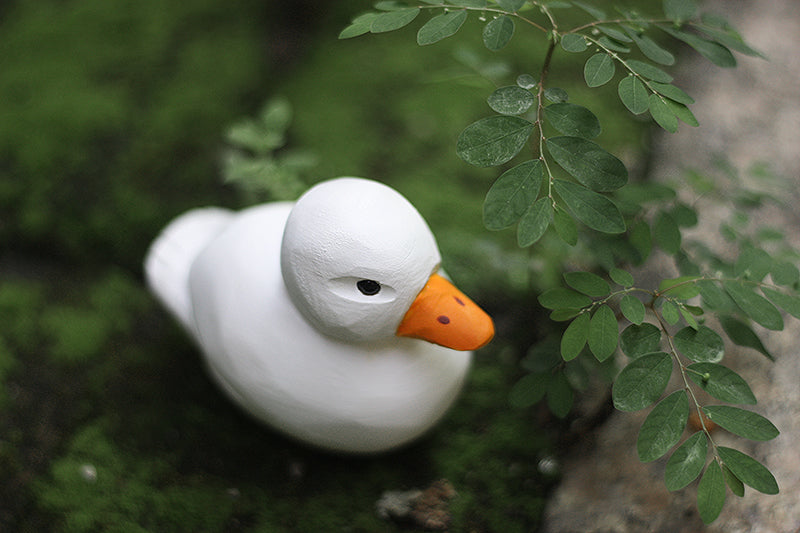
Come nutrire la tua adorabile anatra Cole: una guida completa
Share
Prendersi cura del tuo anatra Cole
La Cole Duck, nota per il suo affascinante piumaggio bianco e il becco arancione brillante, è una deliziosa aggiunta a qualsiasi casa o fattoria. Queste anatre non sono solo belle, ma anche relativamente facili da accudire, a patto che ricevano la giusta nutrizione. In questo blog, ti guideremo attraverso gli elementi essenziali dell'alimentazione della tua Cole Duck per assicurarti che rimanga sana, felice e vivace.
Comprendere le esigenze alimentari delle anatre Cole Come tutte le anatre, le Cole Ducks hanno esigenze alimentari specifiche che devono essere soddisfatte per mantenere la loro salute e il loro benessere. Una dieta bilanciata è fondamentale per fornire loro i nutrienti necessari per la crescita, l'energia e il mantenimento delle piume.
Nozioni nutrizionali di base: Le anatre Cole necessitano di una dieta ricca di proteine, vitamine e minerali. Un mangime commerciale di alta qualità per anatre dovrebbe costituire la base della loro dieta, poiché è formulato per soddisfare le loro esigenze nutrizionali. Cerca mangimi che contengano circa il 16-18% di proteine, il che è l'ideale per le anatre.
Acqua dolce: Le anatre hanno bisogno di una scorta costante di acqua fresca e pulita, non solo per bere ma anche per aiutare la digestione. Le anatre spesso prendono un boccone di cibo e poi immergono la testa nell'acqua per aiutarsi a deglutire e processare il cibo.
Tipi di cibo per nutrire la tua anatra Cole Oltre al mangime commerciale per anatre, puoi offrire alla tua Cole Duck anche altri alimenti per garantirle una dieta varia ed equilibrata.
Mangime commerciale per anatre: Inizia con un mangime commerciale di alta qualità per anatre. Questi mangimi sono specificamente progettati per soddisfare le esigenze alimentari delle anatre e sono disponibili in pellet o in briciole. Evita il mangime per polli, poiché non contiene i nutrienti necessari alle anatre, in particolare la niacina.
Cereali e semi: Cereali integrali come mais, grano, orzo e avena possono essere offerti come dolcetti o mescolati al loro mangime abituale. Anche i semi, come quelli di girasole, possono essere dati con moderazione.
Verdure e ortaggi: Le verdure fresche e le verdure a foglia verde sono un'aggiunta eccellente alla dieta del tuo Cole Duck. Le anatre amano mangiare lattuga, spinaci, cavolo riccio, piselli e mais. Assicurati di tagliare le verdure in pezzi piccoli e gestibili.
Frutta: Frutta come mele, bacche e meloni possono essere dati come leccornie occasionali. Rimuovi sempre semi e noccioli prima di offrire frutta alle tue anatre, poiché alcuni possono essere nocivi.
Insetti e fonti di proteine: In natura, le anatre mangiano spesso insetti e piccoli pesci, quindi fornire alla tua Cole Duck vermi della farina, grilli o altre fonti di proteine può essere utile. Ciò è particolarmente importante durante la stagione della muta, quando le anatre necessitano di proteine extra per la rigenerazione delle piume.
Quanto dare da mangiare alla tua anatra Cole Somministrare al tuo Cole Duck la giusta quantità di cibo è importante tanto quanto fornirgli la giusta quantità.
Controllo delle porzioni: Una regola generale è quella di dare al tuo Cole Duck circa 1/4 di libbra di cibo al giorno. Questo può variare in base all'età, alle dimensioni e al livello di attività dell'anatra. È importante osservare le abitudini alimentari dell'anatra e regolare la quantità se necessario.
Programma di alimentazione: Le anatre dovrebbero essere nutrite due volte al giorno, una volta al mattino e una volta alla sera. Assicuratevi che il cibo sia disponibile per loro durante questi orari e rimuovete qualsiasi cibo non mangiato dopo il pasto per evitare che si rovini.
Integratori e dolcetti Sebbene una dieta equilibrata sia essenziale, puoi anche offrire integratori e dolcetti per migliorare l'alimentazione del tuo Cole Duck.
Integratori di calcio: Le anatre femmine, in particolare quelle che depongono le uova, hanno bisogno di calcio aggiuntivo. Per supportare una solida formazione del guscio d'uovo, si possono offrire gusci di ostriche frantumati o un integratore di calcio commerciale.
Grana: Le anatre hanno bisogno di ghiaia per aiutarle a macinare e digerire il cibo, soprattutto se consumano cereali integrali o altri cibi duri. Puoi fornire ghiaia commerciale o lasciare che le tue anatre razzino liberamente, dove possono raccogliere naturalmente piccole pietre e ciottoli.
Delizie occasionali: I premi non dovrebbero costituire più del 10% della dieta della tua anatra. Sebbene sia divertente offrire alle tue anatre una varietà di cibi, è importante non esagerare. Troppi premi possono portare a obesità e squilibri nutrizionali.
 Errori comuni da evitare nell'alimentazione Per mantenere in salute il tuo Cole Duck, fai attenzione a questi comuni errori di alimentazione:
Errori comuni da evitare nell'alimentazione Per mantenere in salute il tuo Cole Duck, fai attenzione a questi comuni errori di alimentazione:
Evitare il pane: Sebbene sia allettante dare il pane alle anatre, offre scarso valore nutrizionale e può portare a malnutrizione e obesità. Attenetevi ad alimenti nutrienti che facciano bene alla salute della vostra anatra.
Fornitura di acqua fresca: Assicuratevi sempre che ci sia acqua fresca a disposizione quando date da mangiare alle vostre anatre. Le anatre hanno bisogno di acqua per deglutire e digerire correttamente il loro cibo.
Monitoraggio per sovralimentazione: Le anatre possono mangiare troppo se hanno accesso illimitato al cibo. Questo può portare a obesità e altri problemi di salute, quindi è importante fornire porzioni controllate.
Un'anatra Cole felice e sana Nutrire la tua Cole Duck con la dieta giusta è essenziale per garantirle salute e felicità. Offrendo una dieta bilanciata di mangimi commerciali, cereali, verdure e qualche leccornia, puoi far prosperare la tua anatra. Ricordati di fornire sempre acqua fresca e di monitorare regolarmente la salute e il peso della tua anatra. Con le giuste cure, la tua Cole Duck sarà una bellissima e vivace aggiunta alla tua casa o fattoria.







